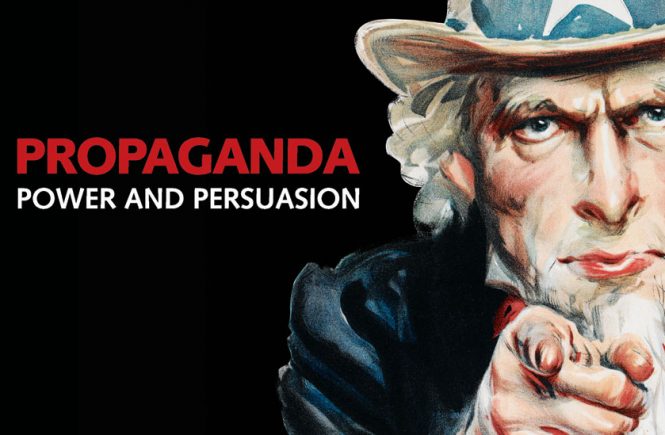MODERN PROPAGANDA THEORY Consider the Hippler and Sproule characterizations of propaganda from earlier in this chapter: simplify a complex issue and repeat that simplification; use covert, massively orchestrated communication; and use tricky language to discourage reflective thought. Some contemporary critical theorists argue that propaganda conforming to these rules is alive and well today and that it is practiced with a stealth, sophistication, and effectiveness unparalleled in history. They point to a number of “natural beliefs” that have been so well propagandized that meaningful public discourse about them has become difficult if not impossible. Political discourse and advertising are frequent areas of modern propaganda study, and the central argument of this modern propaganda theory is that powerful elites so thoroughly control the mass media and their content that they have little trouble imposing their Truth on the culture. Close your eyes and think welfare. Did you envision large corporations accepting government […]
DEFINING THEORY – Post Positivism-hermeneutic-critical-normative
Scientists, physical or social (however narrowly or broadly defined), deal in theory.“Theories are stories about how and why events occur…. Scientific theories begin with the assumption that the universe, including the social universe created by acting human beings, reveals certain basic and fundamental properties and processes that explain the ebb and flow of events in specific processes” (Turner, 1998, p. 1). Theory has numerous other definitions. John Bowers and John Courtright offered a traditional scientific definition: “Theories … are sets of statements asserting relationships among classes of variables” (1984, p. 13). So did Charles Berger: “A theory consists of a set of interrelated propositions that stipulate relationships among theoretical constructs and an account of the mechanism or mechanisms that explain the relationships stipulated in the propositions” (2005, p. 417). Kenneth Bailey’s conception of theory accepts a wider array of ways to understand the social world: “Explanations and predictions of social […]
SCIENCE AND HUMAN BEHAVIOR
Ours is a society that generally respects and believes its scientists. Science is one of the fundamental reasons why we enjoy our admirable standard of living and have a growing understanding of the world around us. But not all scientists are revered equally. British astronomer and philosopher John D. Barrow opened his 1998 book, Impossibility: The Limits of Science and the Science of Limits, with this observation on the value of science and its practitioners: Bookshelves are stuffed with volumes that expound the successes of the mind and the silicon chip. We expect science to tell us what can be done and what is to be done. Governments look to scientists to improve the quality of life and safeguard us from earlier “improvements.” Futurologists see no limit to human inquiry, while social scientists see no end to the raft of problems it spawns. (p. 1) The physical scientists and engineers […]
DEFINING AND REDEFINING MASS COMMUNICATION
In recent decades, DEFINING AND REDEFINING MASS COMMUNICATION the number and variety of mass communication theories have steadily increased. Media theory has emerged as a more or less independent body of thought in both the social science and humanistic literatures. This is intendedas a guide to this diverse and sometimes contradictory thinking. You will find ideas developed by scholars in every area of the social sciences, from history and anthropology to sociology and psychology. Ideas have also been drawn from the humanities, especially from philosophy and literary analysis. The resulting ferment of ideas is both challenging and heuristic. These theories provide the raw materials for constructing even more useful and powerful theoretical perspectives. If you are looking for a concise, definitive definition of theory, you won’t find it in this book. We have avoided narrow definitions of theory in favor of an inclusive approach that finds value in most systematic, […]
Different Fields of Sociology & Major Theoretical Perspectives
Sociology is subdivided into many specialized fields, of which a partial list includes: Applied Sociology Collective Behaviour Community Comparative Sociology Crime and Delinquency Cultural Sociology Demography Deviant Behaviour Formal Organizations Human Ecology Industrial Sociology Law and Society Race and Ethnic Relations Rural and Urban Sociology tratification and Mobility Social: Change, Control, Organization, arid Psychology Sociology of: Education, Knowledge and Science, Occupations, Professions, Religion, and Small Groups These topics are not the exclusive property of sociology and other disciplines share its interest in many topics. For example, its interest in communication and public opinion is shared by psychology and political, science,-Criminology is shared with psychology, political science, law, and so on. Sociology is especially close to psychology and anthropology, and overlaps them so constantly that any firm boundaries would be arbitrary and unrealistic. (Hurton and Chester, 1984: 25-27) Major Theoretical Perspectives A crucial element in sociology is theory. A theory is […]
Characteristics & Techniques of Writing Feature Story
Feature Story: A feature story is any piece of writing that falls between the cut-and-dried news story on the one hand, and the w holly fictionalized story or opinionated essay 011 the other hand. It is the product ol tactual reporting and reporting to which are added story elements of imaginative writing and interpretation. The special feature article is similar to news story in that it gives the readers facts in an interesting form. But it goes beyond those facts by multiplying them with study, research, and interviews to instruct, guide and entertain the readers who know about the subject as well as those who do not know. Feature stories can be news stories. Features can be investigative. Features can be in-depth studies. Features can be for fun. The subject can be anything: places- a community, a farm, a business, topics-education, science, economy, religion, philosophy; events-parades, programmes, concerts; people-well known […]
